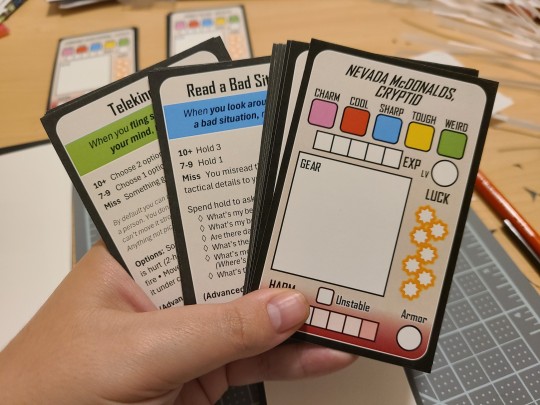25, he/him max can blog about his special interest from his favorite childhood show... as a treat :)
Don't wanna be here? Send us removal request.
Text

i need version of spn where sam gets to wear funny/inappropriate tshirts!
1K notes
·
View notes
Text

I made custom card decks for my Monster of the Week game! I ended up laminating them so players can use permanent and dry-erase marker to note advancements, stats, etc. (You can erase Sharpie by writing over it with Expo marker.)

I also have a larger, large-print set for a player with low vision (not pictured).
I'm working on making the Publisher file and PDF available as a template.
265 notes
·
View notes
Text










So. The Hardy Boys finally found me. Took you long enough.
insp | reference
3K notes
·
View notes
Text
sorry for curling up at your feet and whimpering like an injured dog that wasn't very mysterious of me
24K notes
·
View notes
Text
guess who made a dragon age fic
it's me, i did! it's not that great but it's mine and that's what matters c: davrin/rook my beloved
https://archiveofourown.org/works/62044093
1 note
·
View note
Text
Writing Notes: Adverbs
Conjunctive adverbs: accordingly, additionally, also, anyway, besides, certainly, conversely, finally, hence, however, instead, in conclusion, lately, likewise, moreover, namely, nevertheless, so, then, yet
Adverbs of frequency: always, usually, often, sometimes, rarely, never, ever, hardly ever, occasionally, seldom, generally, frequently, normally, once, twice
Adverbs of time: tomorrow, tonight, yesterday, now, then, today, already, daily, last, next, previously, after, afterwards, early, late, later, since, still, just, seldom
Adverbs of manner: well, fast, straight, hard, loudly, proudly, suspiciously, strangely, kindly, easily, rudely, neatly, quickly, generously, eagerly, accidentally, rapidly, hungrily, foolishly, cheerfully, really (can also be adverb of degree in sense of “very”)
Adverbs of degree: lots, somewhat, barely, very, much, most, nearly, too, extremely, enough, so, slightly, especially, just, almost, scarcely, virtually, fully, far, exceptionally
Adverbs of place: behind, above, nearby, backward(s), toward(s), outside, inside, around, over, overseas, close, away, upstairs, downstairs, here, there, everywhere, deeply, next-door
Adverb - a word that modifies a verb, adjective, other adverbs, or adverbial phrases.
The 6 common categories of adverbs are:
conjunctive adverbs
adverbs of frequency
adverbs of time
adverbs of manner
adverbs of degree
adverbs of place
One thing to keep in mind is that there can be some overlap or repetition across the different categories of adverbs, because words can have more than one meaning or use depending on the context.
For example, yet can be a conjunction, meaning “though,” but it can also be an adverb of time, in the sense “in the time still remaining.”
Conjunctive Adverbs
A conjunction is any word that connects words, phrases, clauses, or sentences. They express the relationship between ideas or parts of speech.
A conjunctive adverb is an adverb that acts like a conjunction.
Conjunctive adverbs are often set off from the rest of the sentence by a comma.
For example: We don’t have time to run to the store. Besides, you already have cereal at home.
Conjunctive adverbs can also go at the end of a sentence, in which case they don’t need to be set off with a comma, as in: I didn’t really want a pony anyway.
Adverbs of Frequency
Detail at what rate over time an action or event occurs.
They answer the question “How often?”
Generally go just before the verb they are modifying:
She always orders chocolate cake.
My brother will never get over it.
Adverbs of Time
Describe when things occur.
They answer the question “When?”
Are very flexible: they can go at the beginning of a sentence set off with a comma, right before thea verb or clause they are modifying, or at the end of a sentence. It depends on the adverb and how it is being used in the sentence. For example:
Tomorrow, the class is going to the zoo.
We last saw her before dinner.
Are you going to Paris next?
Adverbs of Manner
Manner here means “a way of doing, being done, or happening.”
Answer the question “How?”
Can go before or after the verb or phrase they are modifying. For example:
The students quickly ate their lunches.
Our mayor spoke loudly and authoritatively.
Adverbs of Degree
Describe intensity or quantity of an action.
Answer the question “How much?”
Typically go before the verb or part of speech being modified. For example:
We were too hungry to talk during the meal.
The little puppy was extremely energetic.
Adverbs of Place
Describe location.
They answer the question “Where?”
Typically go after the verb or other part of the speech they are modifying. For example:
I think your sister is upstairs.
Go toward the big tree, then make a left.
Source ⚜ More: Writing Notes & References ⚜ Writing Resources PDFs
302 notes
·
View notes
Text

i’m never getting over this line. not ever. thank you for the post op i’m rolling
some jared line deliveries that stuck in my head during rewatch pt. 2
pt. 1
710 notes
·
View notes
Text
some jared line deliveries that stuck in my head during rewatch pt. 2
pt. 1
710 notes
·
View notes
Text


“But it was not your fault but mine / And it was your heart on the line” 🗡️
23K notes
·
View notes
Text
some of my favorite sam winchester icons <3
tw // blood.
(i take requests!)








118 notes
·
View notes
Text

And I carry it with me and I sing it loud If it gets me nowhere, I'll go there proud
Smoker Dean is a canon to me at this point
1K notes
·
View notes






